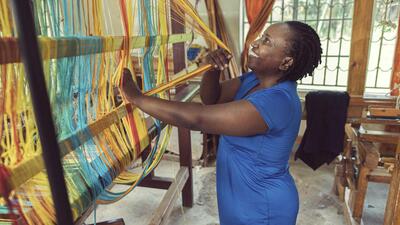
Keeping cross-border trade thriving
How micro entrepreneurs circumvent the on-going challenges of trading across borders
During the first wave of the COVID-19 pandemic, lockdowns drew cross-border activities to a halt, hitting small-scale traders hard. With hardly any business, they had no choice but to use their savings to meet their family's needs. When borders reopened, many traders found themselves unable to restart their business at a level comparable to before the lockdown.
New requirements such as holding health certificates to cross borders, and related costs, even made them reconsider their business strategies.
But trading is a necessity for these micro entrepreneurs, especially for women who are the most active in this field in Africa. It allows them to ensure the wellbeing of their families and send children to school, the best way to escape the poverty trap.

What were the alternatives traders resorted to?
Some started sourcing their products locally, others decided to rely on the services of transport companies, while others went the extra mile and begun considering e-commerce as a viable alternative. Some traders decided to grow the products they would eventually put on the market themselves, as this way their businesses had more of a chance of becoming sustainable.
These shifts, however, did not come easily. Transport companies charge for their services which eats into traders' already meager revenues. Sourcing locally deprives traders of the benefits of buying products at best quality and price, including taking advantage of favourable exchange rates. Becoming farmers requires developing new skills.
Small-scale traders move to informal crossings
To avoid having to face old or new COVID-19-related border formalities, traders consider crossing the border informally. This trade modality, already risky in the past, is increasingly so at present, exposing traders, especially women traders, to health risks, harassment, bribes, fines and confiscation of merchandise if caught by border authorities.
Indeed, immigration officers in Tanzania recently counted more than 200 unauthorized entry points between Tanzania and Zambia. And this is just one example. Crossing the border informally is a way to keep the business afloat but it is certainly not a sustainable plan.

At UNCTAD, we believe that awareness of trade rules, customs procedures, and health and immigration requirements, remains a key component of any solid business strategy.
Just recently, during workshops at selected border posts in Malawi, Tanzania and Zambia, we found that the more traders are aware of their rights and obligations, the less tempted they are to cross borders informally. Moreover, developing entrepreneurship skills allows them to grasp new business opportunities and recover from the downturn of the pandemic.
For central authorities, the task is to not only to facilitate cross-border trade through Simplified Trade Regimes for example, but also to make sure that traders are familiar with them.
The requirements for small-scale traders to trade under this modality could benefit from further simplification such as not having to prove the origin of merchandise.
Authorities should create attractive conditions so that small but potentially vibrant entrepreneurs want to formalize their business, for example by relaxing the registration formalities or making registration possible at the border.
Entrepreneurs operating informally have been excluded from most benefits and programmes put in place during the emergency response to the COVID-19 outbreak. If they realized the potential benefits of formalizing their activities, informal operators might be more inclined to register.
















